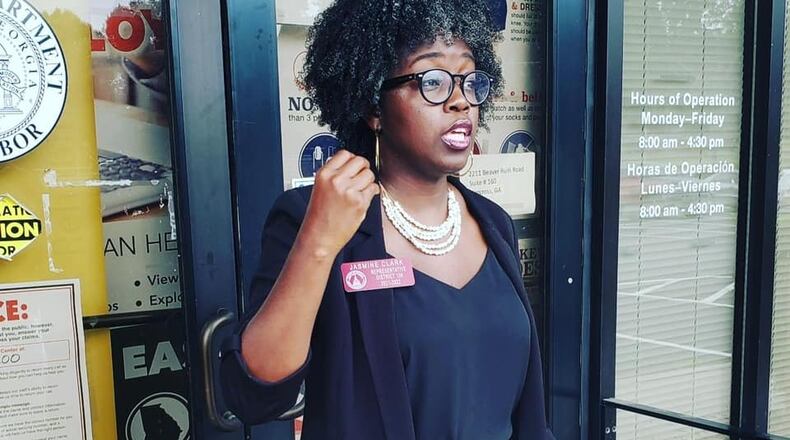Amanda Shorts experienced homelessness in 2012 after her husband, Charles, lost his job. Less than a decade later, the Dacula resident lost her $44,000 job at a civil engineering firm in March 2020 as the pandemic led to layoffs across the state.
Shorts has relied on unemployment benefits while looking for work. At one point, she said it took her five weeks to receive backlogged payments due to an issue with her filing to the Georgia Department of Labor.
Local offices for Georgia’s Department of Labor closed at the start of the pandemic and have not reopened like other state offices. State legislators are questioning why they’ve remained closed as people seek answers to their issues with unemployment benefits.
Many unemployed Georgians have gone weeks, months or even longer than a year without payments. Since the start of the pandemic, hundreds of thousands of frustrated people have been unable to reach labor department workers on the phone or get their emails answered.
As part of a statewide protest organized by the Atlanta-North Georgia Labor Council, Shorts stood outside the labor department center in Norcross on Thursday with Gwinnett state Reps. Donna McLeod, Jasmine Clark and Rebecca Mitchell to demand a better system for addressing claim issues.
The group stood outside the office for an hour until noon, at which time they saw people coming up to the closed doors to find a solution to their unpaid claims, Shorts said. Instead, they found a phone number that goes straight to voicemail, Clark said.
“It’s beyond dereliction of duty,” McLeod said. “... I had a call from one of my constituents saying she’s moving back in with her parents. She’s 40 years old. ... We have people that could not pay for light, water or medicines. This has been the reason why we’re out there, not because we want to stand in the heat.”
Mark Butler, commissioner for the labor department, told The Atlanta Journal-Constitution that local career centers mostly focus on assisting unemployed Georgians with skills such as resume writing and interview techniques. These workers have helped with reemployment and unemployment insurance services since the pandemic started, he said.
“We have had an issue with legislators insisting that people go to career centers to have their appeals hearings, which is incorrect information,” Butler said in an email. “Those types of hearings have been done over the phone for 8 years.”
Clark believes that the career centers should reopen to help people find jobs and address claim issues, even if they weren’t used for this purpose in the past.
“A year later, there are people that have never seen a penny,” McLeod said. “As a human being — to know somebody won’t be able to eat, somebody might not have a roof over their head — you cannot help but be completely in pain for them.”
The department recently said that thousands of people were still waiting for their cases to be heard, many of them appeals. Only about 40% of appeals are usually filed for valid reasons, said Kersha Cartwright, director of communications for the department.
“Legislators have had a point of contact and a system created just for them with dedicated staff members to help with their constituents’ needs during this pandemic,” Butler said. “A lot of the recent cases seen from legislators are people who have been fired or quit, and in some cases have committed fraud.”
Gov. Brian Kemp announced last month that the $300-per-week federal supplements to unemployment benefits would end June 26. His decision came after arguing federal unemployment benefits have kept many from working.
More than 167,000 Georgians will stop getting payments when the change takes effect. About 56,000 others will keep their state benefits but lose the $300-a-week federal supplement. State jobless benefits top out at $365 a week.
“It’s really scary,” said Shorts, who will keep the base unemployment benefits but no longer receive the federal supplement. “If my husband wasn’t working, we would be homeless.”
Mitchell said she doubts unemployment benefits lead people to shy away from taking jobs. Georgia’s unemployment rate is 4.1%, compared to the national rate of 5.8%.
Gwinnett County’s unemployment rate was 3.5% in April 2021, compared to 12.4% in April 2020 and 3% in February 2020 before the pandemic.
“I don’t understand how you can say that, look at the rate of unemployment and not feel strong cognitive dissonance,” Mitchell said. “Our rate of unemployment is low. Obviously, people are getting back to work.”
The state Legislature narrowly passed a bill that would have weakened the state labor commissioner by creating a new post tasked with prodding the department to speed up processing benefit requests from jobless Georgians. But Kemp vetoed the measure, saying it proposes “serious infringements on the separation of powers.”
Last week, some jobless claimants filed a class action lawsuit in Fulton County Superior Court asking a judge to find the labor department in violation of the law for not paying benefits quickly enough. The claimants are represented by the Southern Poverty Law Center and Jason Carter, grandson of former President Jimmy Carter.
In a statement, Butler called it “another politically motivated lawsuit.”
AJC Staff Writer Michael Kanell contributed to this report.
About the Author
The Latest
Featured



